Your Dollars Can Count Supporting Farms in Your Backyard
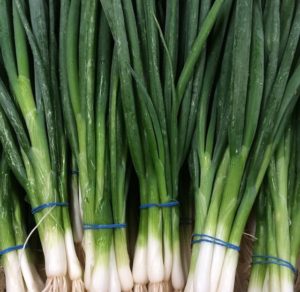
Askelon is a port city along the eastern coast of the Mediterranean Sea. Today Askelon is in Israel, but it’s an ancient city, and people have inhabited the site for at least 8000 years. It’s one of the biggest ports in the Eastern Mediterranean and the root meaning of the name, Askelon, may have something to do with business or mercantile activity. Whatever the name originally meant, the settlement served as a shipping point for onions that were exported by sea. That name of that sea, the Mediterranean, comes from the words “medi,” or “in the middle of” and “Terra” “of the Earth,” or “Terra” —the sea at the middle of the world. Askelon’s aromatic bulbs made for happy customers “all around the world,” and the port city became synonymous with the onion. In fact, our modern word “scallion” comes from Askelon, as does the word “shallot.” Recently we were asked by our friend, Colleen Logan, from Savor the Local based in Carmel, to write a piece on “why people should support local family farms. This week we’re picking scallions for your harvest box. Why should you want to get your onions from a local farm instead of buying a more famous or cheaper brand from “across the sea,” like they did in the good old days?
The food supply is a transnational dynamic these days, as indeed it has been for ages. We need to have the ability to move food around the planet if we’re going to guarantee food security to everybody and keep regional famine at bay. Also, it’s just nice to live in the Northern hemisphere yet be able to enjoy tropical fruits all year long. Food prices in the US are also often cheaper than they otherwise would be, were it not for foreign imports. Farm workers in Ecuador make as much in a day’s labor as a farm worker in the United States makes in an hour, so it’s no surprise that they can ship frozen strawberries from Guayaquil to processors much more cheaply than growers in California can. If produce from far away is not only sometimes more exotic and often cheaper than local produce is, why support local farms? I’m a local farmer; why support me?
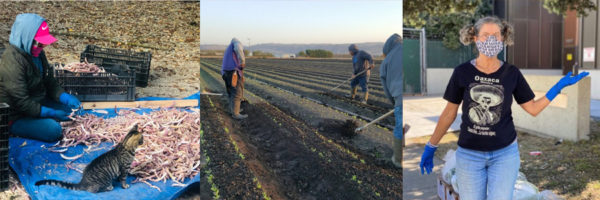 Your local farmer is a neighbor, a member of your community. When you support a local farmer the money you spend on the farmer goes back into our local economy and builds our community. That’s true even when you live in San Francisco or Oakland and the farmer lives in Watsonville. Where does “community” begin and end? When I get on the freeway and listen to “the traffic and weather together every fifteen minutes,” the reports cover all the territory from 17 in the south to Petaluma and 101 in the north – that’s one big bowl of asphalt and concrete spaghetti we all share in common and have to deal with. Some of that traffic comes as local farms and farm workers spend money in your cities and buy your goods and services. It’s good for the community for the money it generates to travel from home to home in circles and keep more locals employed.
Your local farmer is a neighbor, a member of your community. When you support a local farmer the money you spend on the farmer goes back into our local economy and builds our community. That’s true even when you live in San Francisco or Oakland and the farmer lives in Watsonville. Where does “community” begin and end? When I get on the freeway and listen to “the traffic and weather together every fifteen minutes,” the reports cover all the territory from 17 in the south to Petaluma and 101 in the north – that’s one big bowl of asphalt and concrete spaghetti we all share in common and have to deal with. Some of that traffic comes as local farms and farm workers spend money in your cities and buy your goods and services. It’s good for the community for the money it generates to travel from home to home in circles and keep more locals employed.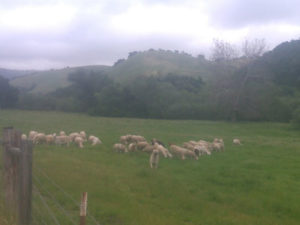 But farmers are more than just neighbors and consumers. The farmers around you are the custodians for the natural resources in your local area. Farmers and ranchers make their living from the soil and water and how they treat those resources directly affects you, whether you buy their produce or not. If you don’t want agricultural chemicals in the water you drink, then support the local organic farms that are producing food without recourse to the noxious chemicals that would contaminate your water or foul your air. If you enjoy the rural character of the hills on the horizon of your community then support the ranchers whose work it is to manage those rangelands. If restaurants and markets in your community make a point of supporting local farmers, ranchers, and fishers, then support them so that they can play their role in creating and maintaining a vital, viable foodshed.
But farmers are more than just neighbors and consumers. The farmers around you are the custodians for the natural resources in your local area. Farmers and ranchers make their living from the soil and water and how they treat those resources directly affects you, whether you buy their produce or not. If you don’t want agricultural chemicals in the water you drink, then support the local organic farms that are producing food without recourse to the noxious chemicals that would contaminate your water or foul your air. If you enjoy the rural character of the hills on the horizon of your community then support the ranchers whose work it is to manage those rangelands. If restaurants and markets in your community make a point of supporting local farmers, ranchers, and fishers, then support them so that they can play their role in creating and maintaining a vital, viable foodshed.- Maybe not every local agricultural producer is doing a good job of caring for the environment that we all share; but support the farms that are good stewards of our environment and encourage them. And supporting local farms is good for the environment because they can have a smaller carbon footprint than larger companies. If you like having cleaner air, then don’t buy food that has to come into the Bay Area on a jet, cargo ship or long haul truck. Put your money where your mouth- and lungs- are. And cleaner air isn’t just about us; we have to breathe the air that blows in from Asia and someone else will have to breathe the smog we create. When there’s less air pollution anywhere in the world everybody wins.
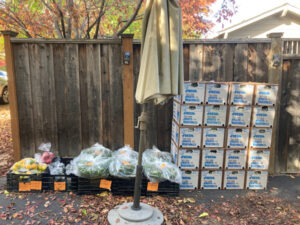 Sometimes local produce costs a bit more than produce purchased in chain stores. Local producers may not use as much energy as distant suppliers in getting their produce to market but they often have significantly higher labor costs or water costs. In some cases local growers may be using practices that are more labor intensive but less environmentally damaging. The local growers need you. When the Covid pandemic hit and all the supply chain disruptions occurred those that had a connection to local food outlets learned the value of supporting their local farms. This farm to table relationship has been mutually beneficial. As a community, we are all better off when the lowest price is not our highest value.
Sometimes local produce costs a bit more than produce purchased in chain stores. Local producers may not use as much energy as distant suppliers in getting their produce to market but they often have significantly higher labor costs or water costs. In some cases local growers may be using practices that are more labor intensive but less environmentally damaging. The local growers need you. When the Covid pandemic hit and all the supply chain disruptions occurred those that had a connection to local food outlets learned the value of supporting their local farms. This farm to table relationship has been mutually beneficial. As a community, we are all better off when the lowest price is not our highest value.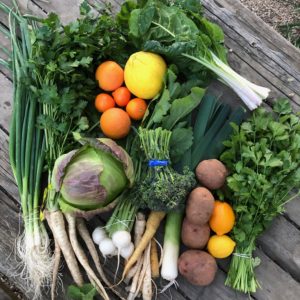 You can get an education of sorts from supporting a local farm too. It’s so easy to find anything from anywhere that a person can almost be excused for having no clue what’s “in season.” It’s always summer somewhere in the world so there’s almost always going to be fresh corn on the cob at some price. But eating locally means living through the seasons with all the ups and downs of the region we live in. Here in the Bay Area we’re blessed with an extraordinary range of local products. Eating seasonally doesn’t have to mean having to give up on things when they’re out of season; we can think of each season as an opportunity to enjoy the best of what our region, our climate, our season has to offer.
You can get an education of sorts from supporting a local farm too. It’s so easy to find anything from anywhere that a person can almost be excused for having no clue what’s “in season.” It’s always summer somewhere in the world so there’s almost always going to be fresh corn on the cob at some price. But eating locally means living through the seasons with all the ups and downs of the region we live in. Here in the Bay Area we’re blessed with an extraordinary range of local products. Eating seasonally doesn’t have to mean having to give up on things when they’re out of season; we can think of each season as an opportunity to enjoy the best of what our region, our climate, our season has to offer.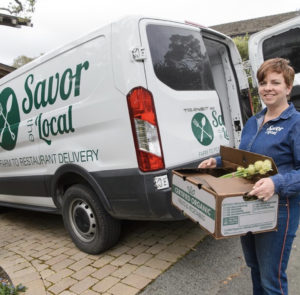 Supporting a local farm can provide a sense of pride in feeling a connection to the people that grow your food and that live in your neighborhood. I’d like to take a moment to thank Colleen Logan for all the support she and Savor The Local have given our farm over the years. Colleen wrote, “I am passionate about what I do. I love supporting chefs who cook with local ingredients that are in season and I enjoy the challenge of bringing interesting and unique items for daily cooking or special occasions,” she says. “I am proud of the fact that the produce is harvested to order and delivered just in time. 95% of what I deliver was harvested that day or the day before. I directly help small farms thrive, by letting them set the prices, the minimum for each item and working with their schedules and means of communication. I also really enjoy the personal relationships I have with each farm and some amazing local chefs.” Her words sure gave me a sense of pride. Thanks, Colleen.
Supporting a local farm can provide a sense of pride in feeling a connection to the people that grow your food and that live in your neighborhood. I’d like to take a moment to thank Colleen Logan for all the support she and Savor The Local have given our farm over the years. Colleen wrote, “I am passionate about what I do. I love supporting chefs who cook with local ingredients that are in season and I enjoy the challenge of bringing interesting and unique items for daily cooking or special occasions,” she says. “I am proud of the fact that the produce is harvested to order and delivered just in time. 95% of what I deliver was harvested that day or the day before. I directly help small farms thrive, by letting them set the prices, the minimum for each item and working with their schedules and means of communication. I also really enjoy the personal relationships I have with each farm and some amazing local chefs.” Her words sure gave me a sense of pride. Thanks, Colleen.- If you care about your local environment and economy it makes sense to find a farmer in your area that has values you want to support. We want to thank all of you reading this because most of you have supported us for a long time through the purchase of our Mystery Boxes and farm products. We hope you will continue to support us and help us get the word out to others that might be interested in good ol’fashioned, locally sourced, farm fresh produce!
The seasons are marching forward. We plant basil this week, and the first summer squashes get sown in the trays. By popular convention our “frost-free” date here in Santa Cruz County is usually thought of as April 15th so we’ll have lots of transplants coming out of the greenhouse around that time. Life is about to get really busy and I’m optimistic about the outlook for the upcoming season.
Thanks, for your support!
Andy and the Crew at Mariquita Farm.
© 2021 Essay by Andy Griffin.
Photo of Gayle at a Piccino Mystery Thursday by Debra Baida.
Photo of Linda Ferrasci’s sheep by Linda Ferrasci.
Photo of pick up site with totes and mystery boxes by Gayle Ross.
Photo of Colleen Logan and the Savor the Local van by Michael Troutman.
All other photos by Andy Griffin.


